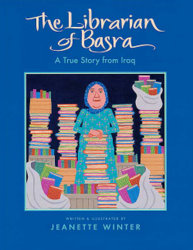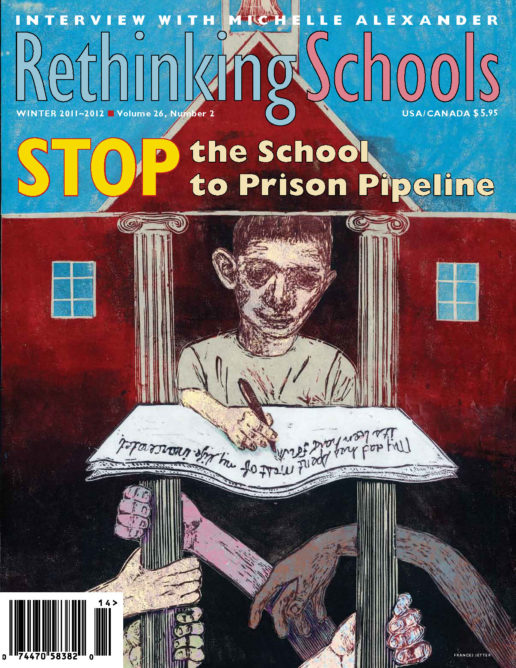Ordinary Heroes
Illustrator: Jeanette Winter

The Librarian of Basra
By Jeanette Winter
(Harcourt, 2004)
As a middle grades educator in Washington, D.C., I found that when I asked students to discuss their heroes or role models, they responded with anecdotes about their favorite athlete or entertainer, with the occasional iconic freedom fighter figure thrown into the mix. They obviously believed that heroes should be people with whom we interact only from a distance—in our imaginations or in history books. This notion compelled me to think about what message we send our students about what it means to be a hero or role model and, moreover, who can be a hero or role model. I decided to develop a unit for our after-school program on everyday heroes, heroes who are accessible members of our community, who we can actually engage with on a daily basis. I wanted to drive home the fact that ordinary people can do extraordinary things and have a profound impact on the lives of others.
In researching this unit, I searched for picture books that portrayed the kind of heroes I wanted my students to think about: everyday people who take risks, often with their own lives, for the good of the communities in which they live. I came across The Librarian of Basra and was immediately captivated by the true story of Alia Muhammad Baker, a librarian in Basra who risks her life in the midst of the U.S. war in Iraq to save the precious books on the shelves in the local library. Alia, aware of the rising tension and the threat of invasion from the United States and its allies, asks the government to assist her in moving the books to a secure location. Her request is denied. Alia refuses to take “no” for an answer. She solicits others to assist her in transporting the books to a more secure location. Alia’s precious library is destroyed. However, Alia and the others rescue more than 30,000 books. Unfortunately, the author never mentions that it is the United States and its allies that destroy the library. Although this is a serious omission, it is an issue that can be raised and discussed as part of the lesson.
As I shared Alia’s story with students, I paused between pages to recount the story of an everyday hero from my old neighborhood: my next-door neighbor who taught me a lesson as a teenager that I still carry with me to this day. I prompted students to think of a person in their own lives who has shown fearlessness, someone they know well who displayed selflessness and who was willing to take great personal risks for a cause, for the sake of others. Once they had that person in their mind’s eye, I asked them to turn and share with a neighbor. Next, I asked willing students to share their story with the larger group.
Students shared stories of neighbors who showed great bravery, and parents and teachers who took great personal risks to ensure the student’s access to an exceptional education. They also shared stories of peers who displayed fearlessness even when it was unpopular and the possibility of rejection was present. In creating this unit, I hoped to plant a seed in the minds of students that a hero can be someone sitting right next to us in our living rooms, walking down our neighborhood streets, or stamping our books at the local library.

